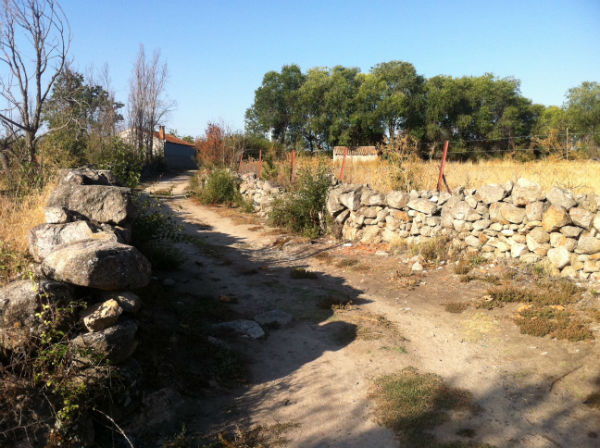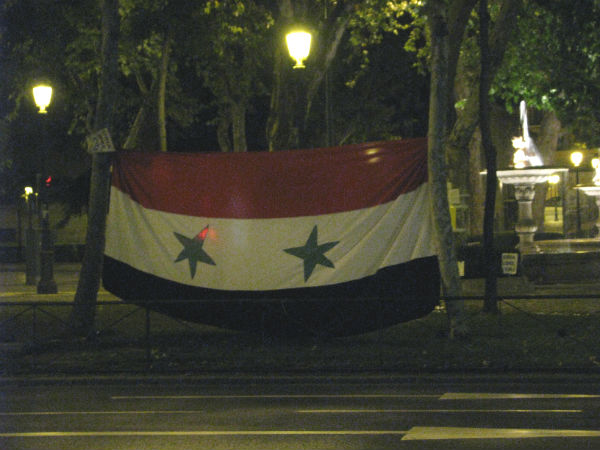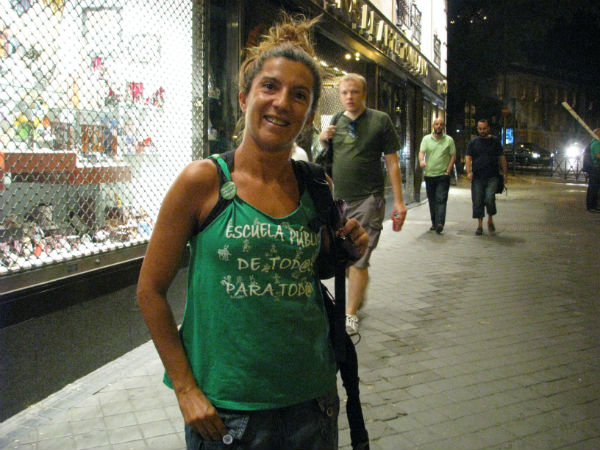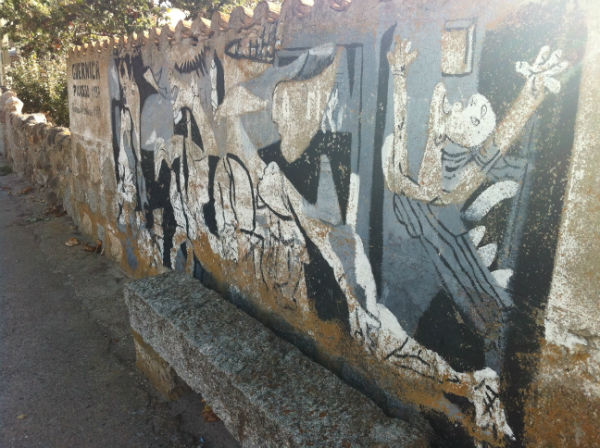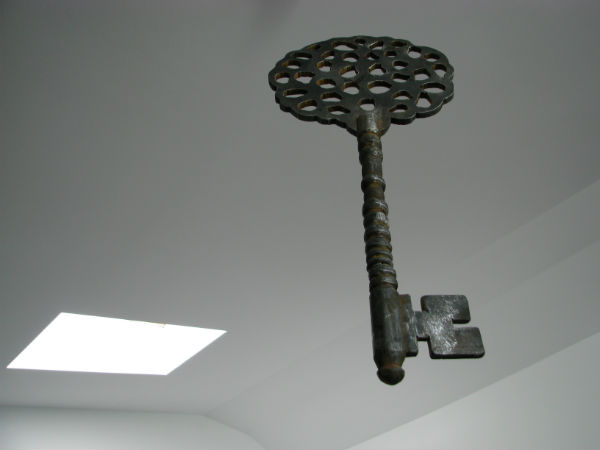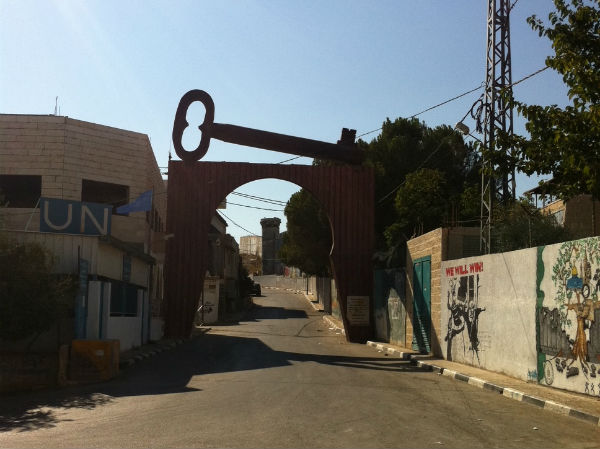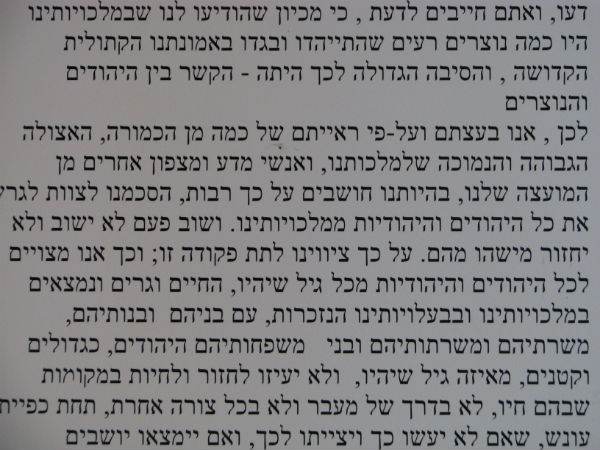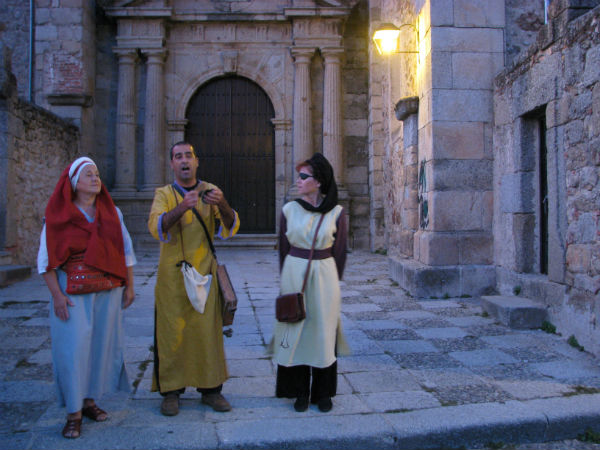Staying on the move in Israel and the Palestinian territories (and beyond) through a month of trial. And today: the Spanish excursion becomes trying for the heart.
A short walk from Atocha station to the hotel, upon returning from Cordoba to Madrid, serves to show just how close to home this place is. On the Paseo Del Prado, righ in front of Spain’s temple of the arts, hangs the flag of Syria and a group of expatriates holds a constant vigil for the dead at home.
One block up the street i find myself walking against a sweeping current of enthusiastic-looking folks in green t-shirts. They’re returning to the station after demonstrating. They are teachers and their struggle is among the last ripple of the M-15 struggle. The tents at Puerta Del Sol and Plaza Mayor were folded when the federal government gave a reply of sorts to the demands, but the teachers’ demands are from local governments, who fail to provide for the public school system. I learn all of this from Olga, who is on strike like 30,000 of her peers. Our social workers and medical interns gave similar fights, with a range of results. I wish Olga and the rest of her green brigade all the success in the world.
One more deja vu comes later, as Maoz and I venture into the Malasaña district’s cobweb of streets, filled with a mix of traditional bars, (not dissimilar from south Tel-Aviv’s “khamarot”) and global-spirited hipster bars (the “Tupperware” into which I step, could have been the “Soda Bar” on Begin Road). The world may be burning and the teachers may be starving, but good times have to be had.
The following day we head west in a minibus, stopping two hours down the road to have coffee in a village so tiny and insignificant even the local bar owner take time to recall what it’s called. It’s called Muñogalinda.
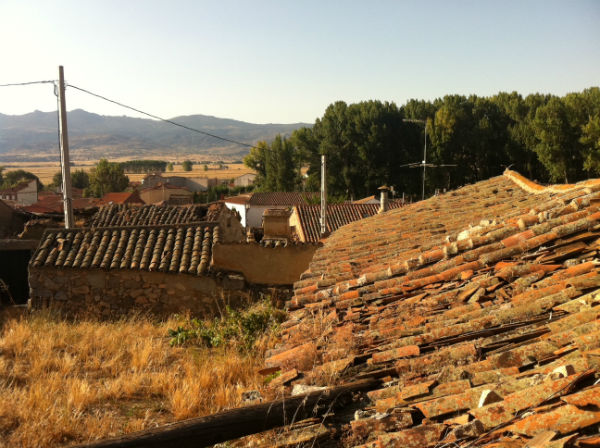
I can’t seem to stop comparing. This place bears so much resemblance to Tel Al-Baida, the Palestinian hamlet I visited on the first day of this tour. It’s the same size and sits by a similar road in a landscape just as yellow and desolate. Here is peace. There is occupation. Unfair, unfair, unfair.
Just as I am contemplating whether to spit or shed a tear into this soil so cruelly favored by destiny, the road takes me by a the wall of a pig pen decorated with a replica of Picasso’s “Guernica,” a reminder that Spain is a hard land, that it knew a civil war and dictatorship in the past century alone.
These are the moments that give me hope. Seventy years ago Europe was a slaughterhouse. Now look at it. If they can do it, so can we. Yigal, the crude bus driver who drove me to the border with Egypt, quoted Ehud Barak: “Israel is a villa in the middle of a jungle.” we are led to believe that a normal future is impossible, since our neighbors are savages, but Middle Eastern people have never been one tenth as brutal as the Europeans so recently were.
Our destination, the town of Béjar, reminds me of another of the first day’s stations: unlucky Beit Shean. There industry never really took off, here it shut down. Fifty textile mills line the river valley beneath the steep range on which the town is perched. All but five are silent.
Right on the cliff’s edge sits the ancient Jewish quarter, the origin of all families named Bakhar or Bejerano. In the quarter is a Jewish museum and in the museum hangs its emblem: a key topped with the head of a chestnut tree, common in the region.
“Who can tell me what they key in the emblem represents?” Lea asks, as she would one of her groups of teenagers.
I do, I’ve seen it before, about a month ago, when visiting the Aida refugee camp outside Bethlehem. I even have the picture still, stored in my phone.
“The Nakba!” I exclaim, gleaming like a proper teacher’s pet.
She simply ignores me, speaking only of the chestnut tree and then changing the subject. She brings up the key again only later, when my comment has faded. Indeed, what she says would ring familiar to any Palestinian. The Jews of Béjar could take only a few of their belongings with them. After a few years, only two souvenirs remained: the keys of the old houses and the Castillian language.
On the ground level of the museum is posted a Hebrew translation of the original expulsion order that was read on Bejar’s main square one morning in 1492.
This bring on the most punishing deja vu of all. The language is nearly identical to that which appears on pamphlets given out on Israeli streets by such organizations as “Yad La’achim” warning that contact between Jews and Arabs leads to abduction of Jewish girls.
Lea reads the order out loud: “We were told that in our kingdoms there are some unworthy Christians who converted to Judaism and betrayed our holy Catholic faith, and all of this due to contact between Christians and Jews.”
Her voice breaks as she reads, she is crying. I, on the other hand, am furious. I feel as though I am staring directly into the eye of my society’s disease.
This disease has a name: it is called lack of empathy. We run tours, supported by the Ministry of Education, to educate the young about our keys, but make laws forbidding others from remembering the keys we caused to be kept. We weep at prejudice directed at us. How much we would weep had we internalized the degree of prejudice haunting our minds. This would just be scary to do. The pill that fights our disease isn’t only bitter. It harbors a side effect of nightmares.
Gotta relax. I walk out of the museum and stuff my pipe with good tobacco Ruthie brought me from New York. It helps, I’m calming down, but then my eye meets an add for beer poster on a supermarket window and I become furious again. 2.10 Euros for a six pack? This stuff costs three times as much back home! How did we ever let the tents fold? Right there was the answer to everything, be it beer prices or closed mindedness. and we just let it go.
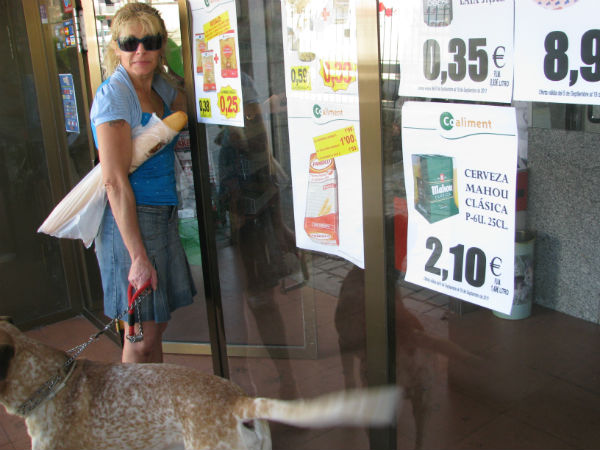
I regain my confidence in Lea in the evening. We walk through the heartbreakingly beautiful old town of Hervas, all lit in dramatic yellow by old fashioned streetlamps. Leading us are members of a musical group called “La Karamba.” They sing old Jewish songs, tell of the old community and are even dressed in a manner expressing some romantic notion of Jewish history, complete with kippas for the men.
I hear whispers coming from within our group: “They’re not Jewish? Then whatever possesses them to do that?” Lea, on the other hand, is enchanted, and also critical. “They are so much more tolerant then we are,” she says, “They really do see culture as a bridge, a bridge that can be crossed.”
We walk into a Jewish restaurant run by the lovely Avigail, an Israeli who married a Spaniard and found herself living in the region of Extramadura, Spain’s poorest region. The region has grown quite a bit poorer since. Avigail tells that during the previous week, three days passed without anyone walking through the doorway of her extremely attractive restaurant.
She is excited to hear Hebrew, a language seldom spoken here, and perhaps a tad less excited to hear me and Ben-Dror Yemini, senior columnist at Ma’ariv and the highest profile journalist on the tour, going at each other over politics. Ben-Dror can be surprisingly pragmatic in his views, but often resorts to Jewish Israeli tribalism and ruthlessly attacks critics of contemporary Zionism. So far we managed to contain ourselves and enjoy each other’s company, but the speech Obama gave earlier today at the opening of the UN General Assembly’s session brings us over the edge.
Obama urged the Palestinians to give up their unilateral statehood bid, advocating dialogue. I am soundly convinced that the Netanyahu government isn’t interested in productive dialogue and that the Palestinian had better do something to stir even a little change. Ben-Dror would only except such a move when he hears Abbas relate to Israel as a Jewish state.
“You’re just trying to avoid change,” I tell him, “And that’s because you’re comfortable with the current state of things. You don’t live behind a concrete wall, you don’t go through checkpoints.”
“Look,” he says, “I’m against the occupation, I’m against the settlements, but I want a Jewish State. I will sign any agreement with the Palestinians as soon as you’ll find me 100 of them who would subscribe to the concept of two states for two nations.”
I’m thinking back to my day in Hebron and Dura, the day of the arrest. Literally everyone I met on that day was looking forward to a two state solution. No one besides the policemen knew I’m Israeli, so no one had any reason to beautify things for me. “I think I’ve begun to meet them,” I say, “I don’t have a hundred yet, and I think everyone would want eventually to discuss the refugee issues, but by the laws of probability I can pretty safely assume they’re out there and I think we can find solutions. Read my blog.”
He doesn’t express an interest in reading it, so I blame him for avoiding information that contradicts his views, and he blames me for being against a Jewish state and altogether insane. Lea holds hear head in her palms. The tea cup rattle on the table. It’s time to head out into the yellow streets and try to keep the neighbors’ peace.
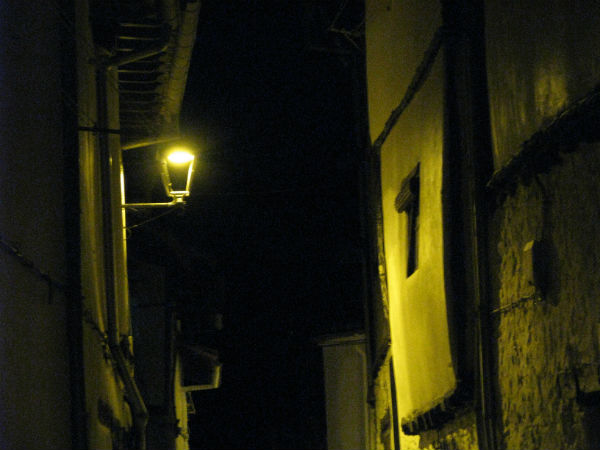
We only make friends again in the car traveling back to Béjar, talking about the starry sky, Verdi’s operas and Yemenite food. This time the deja vu isn’t complete. When arguing with Yigal the bus driver about the same issues, he had to make some crude joke about dumping his mother in law in the desert in order to cool the spirits. Ben-Dror is a gentleman. For a political foe like him, I’m glad to fight the old disease, try to empathize, recognize the fears behind the harsh statements, and maybe learn something too.
Click here for more of the September journey
Thanks for reading and taking part in the adventure. If any of you would like to pitch in for my travel and food, please do so using the “donate” button at the top of this page. Please be sure and specify that you are contributing to Yuval’s September Journey. I’m deeply grateful to those who already donated. Thank you so much! This trip would have been impossible if not for you.


